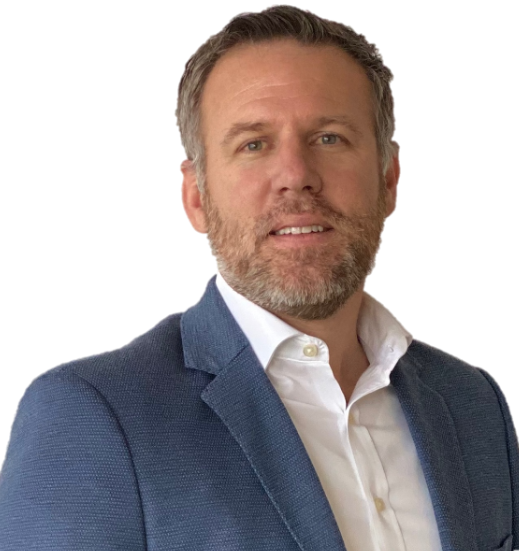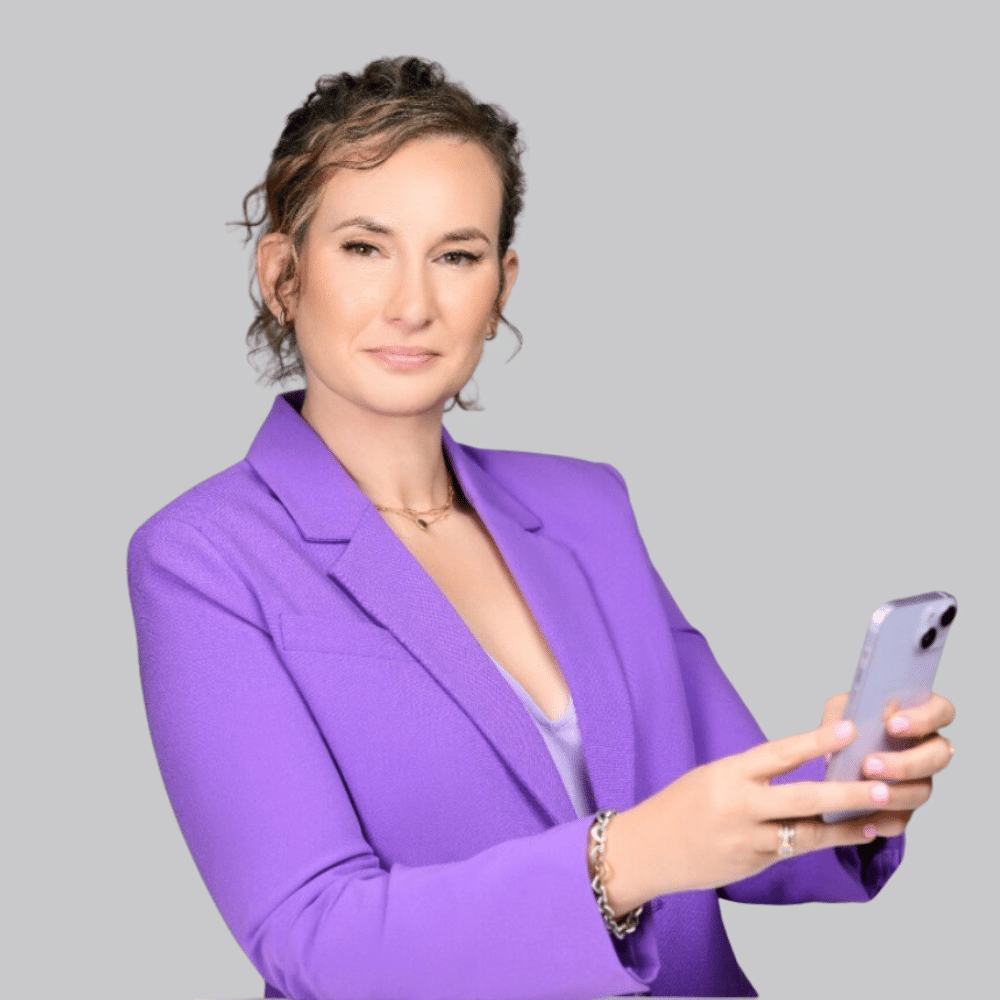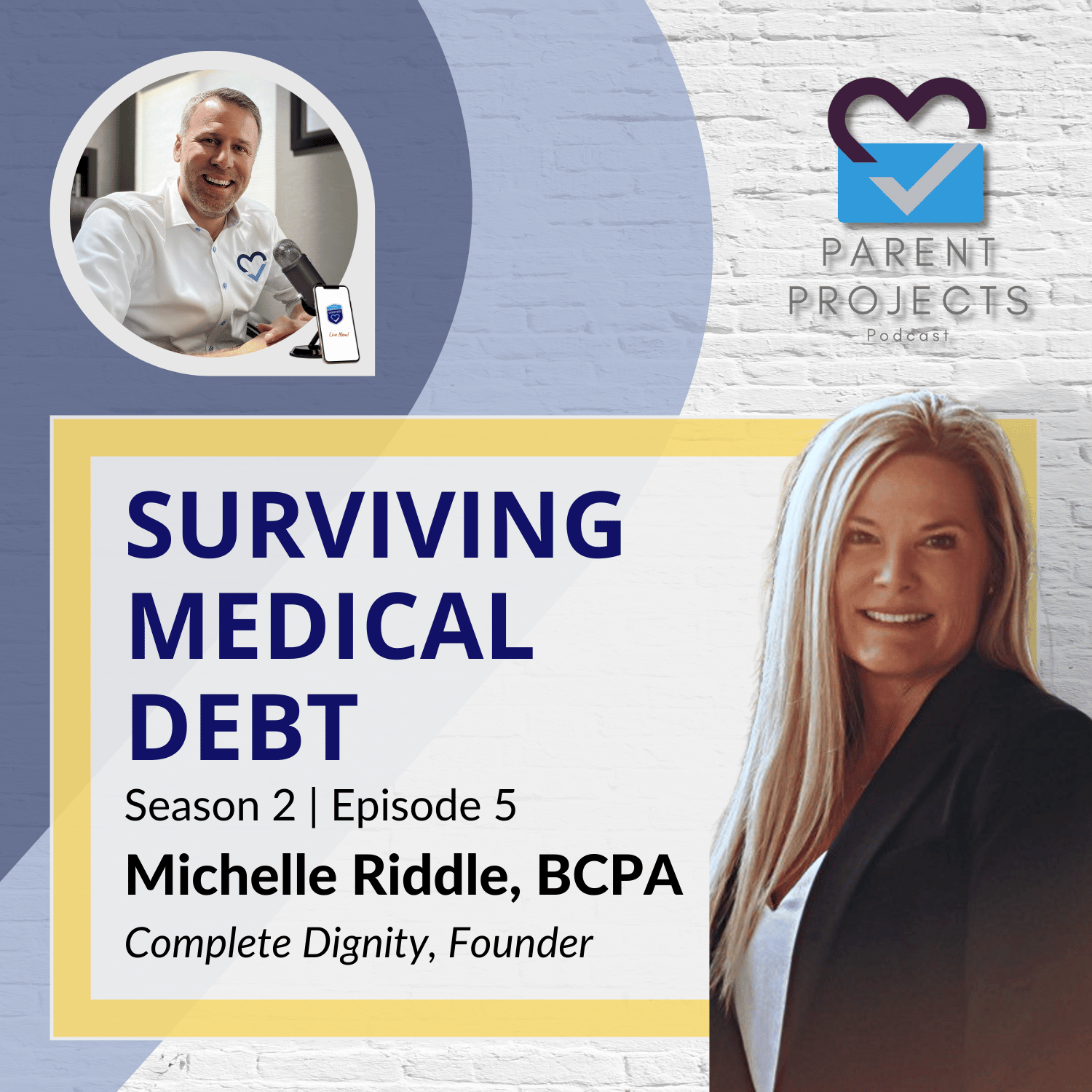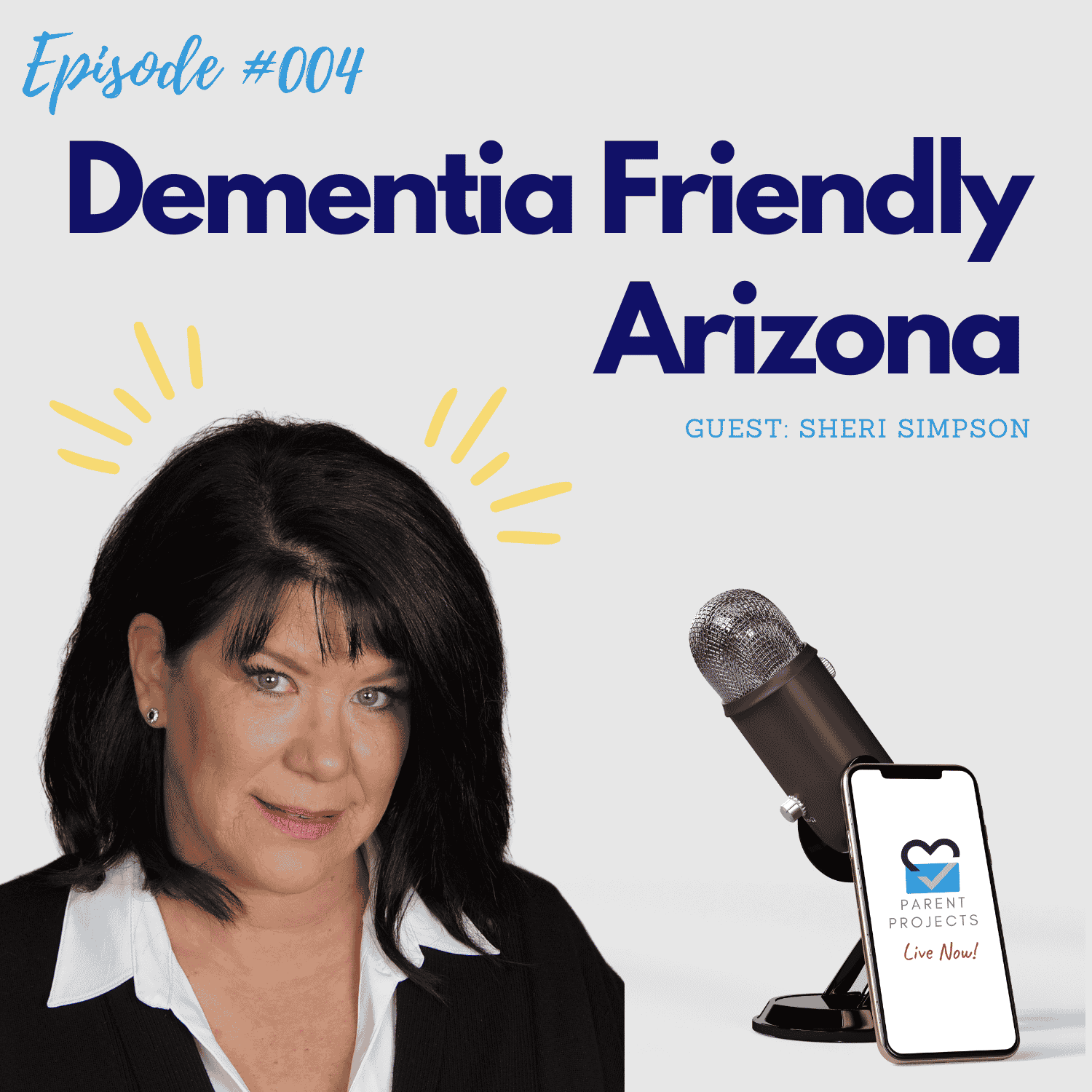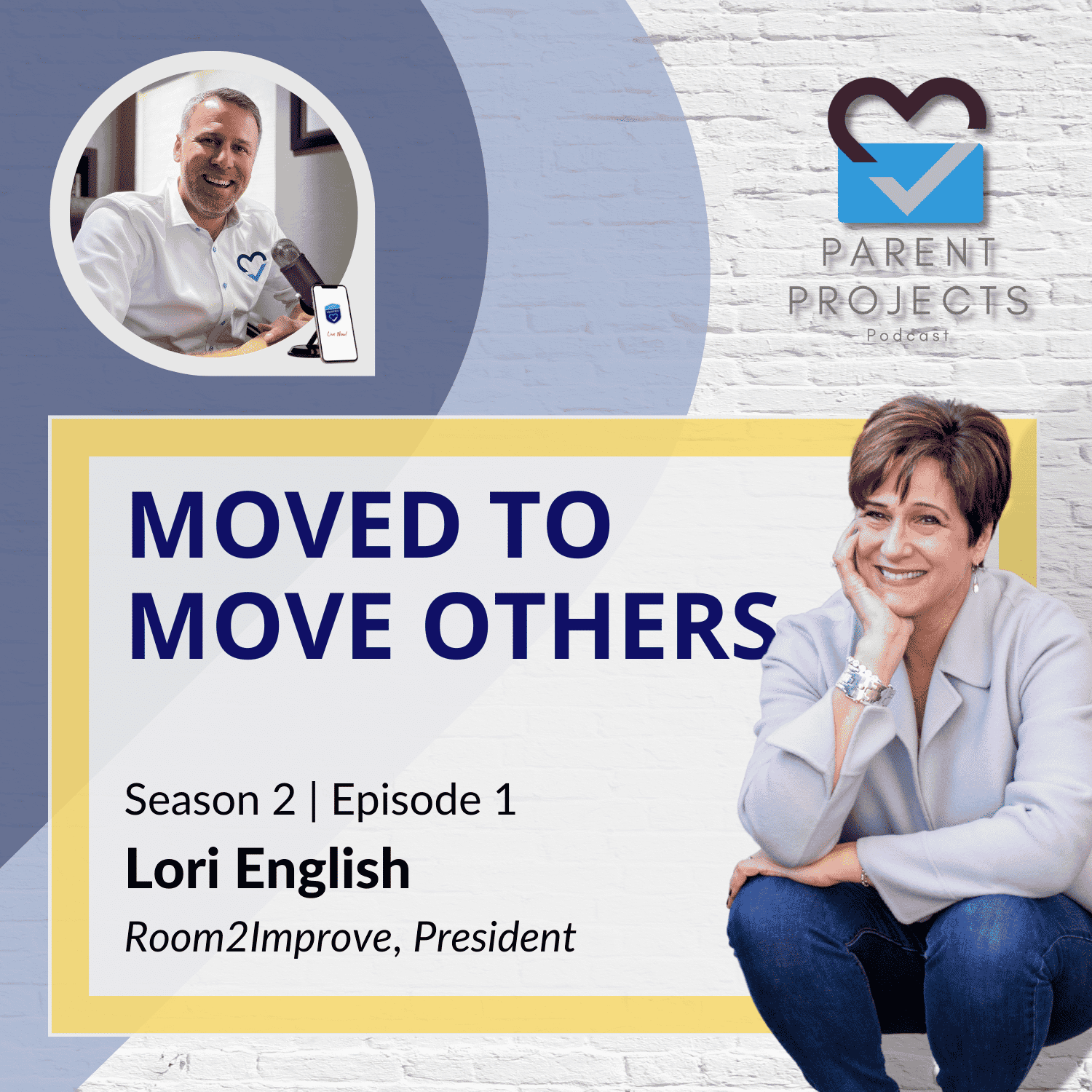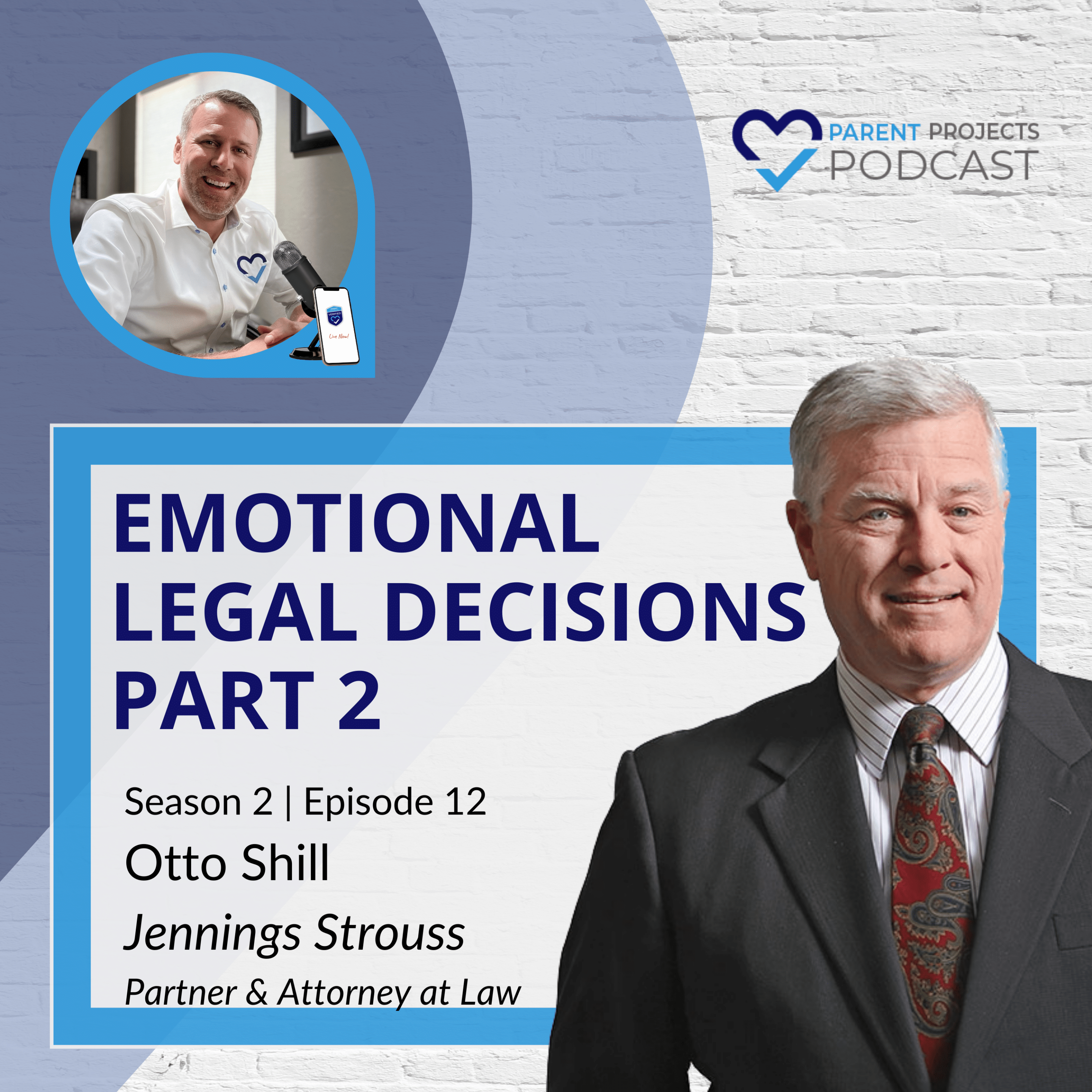Speaker 1 00:00:06 You're listening to parent projects.
Speaker 2 00:00:10 Well, the holidays are right around the corner here for parent projects and for our families. And as we get an opportunity to travel back to see our loved ones, it's kind of one of those opportunities where a lot of people start seeing that there's things piling up issues that need to be dealt with. And you might even be facing some situation where you think the voice of your loved one isn't being heard the way that it needs to. Today, we've got Michelle Riddle with Complete Dignity Healthcare Advocacy, and you're gonna learn how she can take a, a couple of very key approaches into the marketplace to help your parents' voice be heard with healthcare a at advocacy. So stay tuned, and here we go with Michelle Riddle.
Speaker 1 00:01:11 You're listening to Parent Projects, a Family Media and Technology Group Production. Now here's your host, Tony Seas.
Speaker 2 00:01:20 Hey, guys. In about 2015, 2016, uh, you know, I was in senior move management projects, Laurie, I was helping some families, uh, make their ways through some pretty difficult, um, medical situations. I'm gonna imagine you've run into 'em and you've, you've seen it happen. Yeah. And, and they are, They, they're those times where the patient-centered healthcare system sometimes loses families and people get a wash in that system, particularly as age sets in technology drops on top of all of that, and the busyness of life separates us from each other. So today, uh, we are just thrilled to have Michelle Riddle join us from Complete Dignity, uh, an organization healthcare advocacy that I personally used in our practice of senior move management, uh, back with senior moves. And, uh, am just thrilled to have her join us today. And Michelle, how are you?
Speaker 4 00:02:15 Very good. I'm very honored to be a part of your, uh, your podcast, um, live show and, um, very excited about educating, um, uh, everyone on the pitfalls and struggles and tools to help, uh, individuals navigate the healthcare industry
Speaker 2 00:02:39 Now. Awesome. Because if somebody's watching this, chances are they're in a situation where they're a bit overwhelmed, either by the system themselves, or they're recognizing particularly that they've, they've got a loved one or a family member, and they've gotta figure out how to, how to even enter this thing. How do they, how do they have a right to do it? What's the right standing? Where do they go, and at what point in time do they turn to somebody like you and healthcare advocacy to step it up and help them? So, thanks for joining us as we walk through that. You know, um, I think one of the first things I'd really love to do with you is, uh, is have you talk us through how you end up in standing up a business. You're an entrepreneur, you're a founder, you're president of an organization. It's clearly been thriving over the course of the last, what, seven years now, and a lot of changes have happened in the marketplace. What, what is this story for you, um, that helps you understand these, these parent projects and commit your life into a business that helps people, uh, in this situation?
Speaker 4 00:03:42 So, I started back in 2015, and I was actually a, um, uh, school, uh, nurse. Uh, so, um, I was a sub nurse for, uh, a school district, and then went full-time in a high school. And I was, um, so they're called health assistants. Um, they're school nurses, health assistants. And, um, I was working in that, uh, industry. And I have, um, uh, pretty extensive background, my clinical, um, hours that, uh, I worked in an acute rehab in Charlotte, North Carolina, worked on the brain injury, uh, stroke and spinal cord team, uh, for quite some time. And, um, so, you know, the medical industry has always been, uh, my passion. And so working as a, uh, health assistant school nurse, um, my father was very ill, and I managed his care. And I used to go back and forth, uh, to his home and, uh, taking him to doctor's appointments and so forth.
Speaker 4 00:04:50 And my father told me I'd be a really good patient advocate. Well, I had never heard of a patient advocate, and so I was like, Oh, that's super sweet, dad. Um, but that's not a job. So, um, but thank you. Anyways. And my dad passed away in 2013, uh, and, uh, two years after my dad had passed, uh, or actually almost two years after my dad had passed, uh, a friend of mine had reached out and, uh, wanted to grab lunch. I hadn't seen her in a long time. I asked her what she did. She told me she was a patient advocate, and I was like, Oh my gosh, are you kidding me? It's a job <laugh>. So I was like, You know, my dad, my dad's gone. I told you. So, you know, And, um, so I went, uh, back to school. I went, uh, to Cleveland State University, Uh, went through their patient advocacy program and got, uh, uh, certified in patient advocacy through their program. And then, um, I'm actually one of the first board certified patient advocates in the country. Uh, so advocacy is a somewhat of a new field. It's been around for a while, but it's really, um, uh, blossoming and establishing, um, the profession in our healthcare, um, uh, realm because it's a needed profession.
Speaker 2 00:06:19 I was gonna say that, that that bridge between the technical, I don't know if bureaucracy is the right word from that, but it is a process and it's a, it's a train, and if you're not on it, it's hard to jump onto it and to understand it. And somebody just to break the language down ICD 10 codes and what's this? And how's that inter, how does that make a difference on whether or not something pays or doesn't, or,
Speaker 4 00:06:41 Right.
Speaker 2 00:06:42 Yeah. So, so your experiences with your, with your dad kind set a seat, it sounds like, for you. How did you know that you, you know, outside of getting some training and working through that, how did you know that you had a business, that it was something that you really knew people were gonna jump on? And, and what kinds of people hire a, a patient advocate and healthcare
Speaker 4 00:07:03 Advocate? Everyone, anyone and everyone, because healthcare, the healthcare industry is so confusing and so complex. And even for individuals who are in the industry, you're not gonna be able to know everything surrounding the industry. So the navigation of, um, of your healthcare crisis or your, uh, healthcare billing situation or, you know, managing a, um, uh, a condition or maybe you were, were given a diagnosis that you've never heard of. Now what do I do? And, you know, there's, there's so much communication and research that is absolutely critical in, um, in basically being informed of what your, what your options are in order to have an optimal, uh, plan to move forward. Whether that's to get, um, your bills, um, properly processed and what your financial responsibility is, or in the managing care realm, making sure that you're actually getting the care that you need and deserve.
Speaker 4 00:08:12 And not, um, you know, Arizona just passed a, um, uh, amended law for the right to try. And I actually, um, uh, testified in front of the, um, house of, uh, representatives in order to get this right to try passed. Uh, and it, uh, and I'm happy to say it is, uh, uh, was passed. Um, but what Arizona has actually taken to the right to try is they in individualized it. And so now they look at the DNA in order to determine what is the, what is the, the proper, uh, uh, treatment for that patient based on their dna. So when you're trying to manage your care, it's not one size fits all. You may have a lot of similarities that may fit in that lane, but it's not necessarily your lane. So it's the navigation of that,
Speaker 2 00:09:11 That, that is. Okay. So honestly, I just thought healthcare was a breeze. And until the DNA thing being he said facetiously, that is, that is, that's crazy. That's, it's phenomenal to watch when those things come in, um, of technology and the application of that. But, uh, in some ways it's, it's, it's absolutely amazing that, that we can get down to that level and understand a customization from that, and that we can find a way that the laws can actually, how that tempers in can account for some of that stuff on the other side. That DNA just opens up, seems like it opens up this whole other realm of hopefully, or hopefully not. Um, well, great possibility, but a lot to have to learn in, in a hurry. And so, uh, so, you know, I think what would be great to do is we're gonna give our, our listeners a quick break, um, for a second for our, from our sponsors. But when we come back in, can, I'd like to break that down is, is people are moving through, um, the, the ideas of what advocacy is and what they could be doing with that. You know, Lori, if you could just really help unfold that, let's, let's unfold that onion and how people and families can walk their self around, um, advocacy and what its role is in their project when we return
Speaker 2 00:10:51 And coming back in today, uh, we are here at the Para Projects podcast. We've got Michelle Riddle of complete dignity. Uh, we've been going through, uh, when you stumble upon that situation, mom and dad have got a need, and, uh, and you've recognized that now you gotta figure out what advocacy in the role is. Um, boy, Lori, have, you know, I don't know if you've seen this from there, what you're, you're advising a family as senior move manager. Uh, you see that they're underwater from something like that. Right. I'll, I'll let you kind of take this conversation and, and what that looks like for you guys and, and Michelle.
Speaker 5 00:11:26 Yeah. You know, I think we've, we've kind of touched on a little bit the fact that it, healthcare is not just one straight path. There's like 50 million tangents and bunny trails and loopholes and dictionaries all over the place with different pieces of it. So, you know, we're all about to kind of converse for the holidays and come in and meet our families and see things, which is a really awesome time to step back and sort of look, talk to us a little bit about as we go in and we're looking or having dinner with our parents, we're sitting in front of them, we're with our siblings, and, and we're, we're at a great time to observe and maybe make a plan for next year. What is the importance of advocacy, maybe before crisis hits? And then as the family comes into it going forward, after they come out of a crisis, what, what, how do you feel they should be looking at advocacy, and how do you feel they should be pulling that in and really embracing it and using it to help their family members?
Speaker 4 00:12:26 Sure. That's a great question. Um, you know, the, I think taking the holidays and the opportunity to build those relationships, um, I shared a while ago that individuals, especially the older population, they don't want to burden anyone with their, um, illnesses or concerns or, or pains or ailments or what, whatnot. They just, they, they wanna talk about something happy, They wanna talk about you. They wanna talk about, um, you know, the grandkids. They wanna talk about, you know, everything and everything that's going on in their life, but they don't want to really share, um, what's going on in their life because they think it's a burden. So I think you, you need to open up the dialogue in a more, um, uh, relaxed, um, manner that is almost like you share, I share and you share situations that is, that are, uh, is going on with you.
Speaker 4 00:13:34 And then they can share situations that is, um, you know, that's going on with them. Um, one of the things, and I sometimes, I'm kind of a, a bull in a China store, I, I really ask a lot of questions and, and, um, I, I'm a sponge. I, I really enjoy information and knowing as much as possible, um, about, um, you know, my family members or my patients or my friends. Uh, and so the one thing, and I know this may sound kind of elementary, but a red folder like this, um, I highly, highly recommend is starting a red folder. And, um, you know, what are, what are their medications? Looking at all their medications? Usually it's in a, a Tupperware container or it's on a shelf and you have no idea what they're taking. Is there any interactions? Are there, do they have to take that?
Speaker 4 00:14:33 Are they taking too many of the same type of medication? So really opening up the dialogue, looking at all their medications and making it lighthearted, not serious, but lighthearted, because if it becomes serious, then it's a burden. So if, if you're just like, Oh my gosh, look at all this. And then you start writing everything down, making that list, starting the red folder, and, um, you know, Hey mom, hey dad, so you, you're taking this medication. What is this for? Oh, they're saying something has to do with my heart, da da da, da. So, okay, so now we're, we're now looking at diagnosis. We're looking at, um, okay, we've got a heart situation. And look at the medication bottle and see who that, uh, provider is, Write down who that provider is that prescribed that medication. Then it's, you're basically, um, you know, you're an investigator, you're peeling back the layers of the onion to figure out exactly what's going on with mom and dad. And now you're, um, you're putting together a red, um, uh, folder with all that information. And so it's easy to stay on top of it and to understand, um, is there any, um, mistakes? Are there any, um, you know, maybe the, the, the doctor has no idea that that same medication is being prescribed by another physician and they're taking double. I see it. So, Oh, it's
Speaker 5 00:16:07 All the time.
Speaker 4 00:16:07 It does. And so if you, if you, again, make it lighthearted and, um, you know, just open up about what's going on with them and funny stories and, you know, and just, it's lighthearted, but you're getting the information that you need.
Speaker 5 00:16:27 Right. And I think that people are always more receptive when it comes from a place of just caring. You know, you're not trying to boss 'em around. You're not trying to double check, you're not questioning what they did, but you're actually just, you just really wanna know, and you wanna make sure they're okay. And I'll tell you, my heart starts beating so fast when you talk about a red folder, cuz I'm thinking, I'm, I also do a lot of organizing and paperwork organizing, and I'm a binder freak. Yeah. So what I did for my parents as they aged was I actually made binders for them, and I had a tab that did all their prescriptions, and I had a tab that did all of their doctors. And I had a tab that did, you know, schedule and appointments and things like that. And it's, so it was helpful for me because I could oversee, and when I went to visit, I could go check on it or ask questions.
Speaker 5 00:17:11 It was a great conversation piece, but it was also, it helped them mm-hmm. <affirmative> and just keeping things organized and knowing where to put things. And I had a piece of paper in the front that said questions, you know, we would just kinda have a running list of questions. So I think that's a phenomenal idea and a great simple way for families to really engage and get into that advocacy role without, I, I tend to be like you, I'm in a time shop, I just wanna mm-hmm. <affirmative>. Ok, let's, Oh, and that's, everybody wants that, that sometimes you need settler approach. And I think that's a beautiful way to ease into that and to come into a place where you're really helping them manage their care effectively. And that forbid if something happens, you can grab that red folder and, and take lead if you need
Speaker 4 00:17:58 To. Absolutely. Yeah. And that red folder should go with you at all your doctor's appointments. Yes. Because again, you're trying to, you know, the, the key, uh, term in healthcare is patient-centered care. We hear it all the time, but patient-centered care is not necessarily happening because, you know, the patient is in the center and then you've got all these different specialists on the outside, but they're not all communicating. So if they're not communicating, then that care is not taking place for the patient. So it's, it's individual care that's taking place, but it could be, uh, conflicting with another provider. So that's why that little red folder should go with you always everywhere. And so, so, you know, the, the provider knows exactly what's going on and, you know, statistically, uh, your time in the doctor's office is less than nine minutes. And I actually think that it's less, definitely less than nine minutes. I mean, nine minutes is, I mean, that's a long time to be in the doctor's office because they usually don't take that long with
Speaker 2 00:19:08 The doctor. That's the I'm
Speaker 5 00:19:11 The, so,
Speaker 4 00:19:15 But the, um, but when you take that folder and you're, what a great, um, uh, part of your folders to have a list of questions, have that list of questions prior to, to going to that doctor's appointment for that doctor. So what if that doctor is your cardiologist? It has to do with your symptoms surrounding, um, uh, the, my heart. You know, your, your heart situate, your blood pressure, your, uh, are you feeling nauseous? Are you feeling whatever? If you have those lists completed ahead of time, I highly recommend submitting it to your doctor prior to your appointment so that doctor has the opportunity to review your symptoms and your concerns and potentially options. Maybe you have something you'd like to try that you wanna put in there. So then that less than nine minute appointment, you've got an outline and you're gonna stay on, on track and you're gonna get more out of your appointment than coming into the appointment going, Oh, I think I, oh, I can't remember that because you do, you get, you, you end up giving the headlight look and, um, and you forget the questions that you had. So you always bring that outline with you and then send it to the doctor prior to, uh, your appointment. So they're prepared.
Speaker 5 00:20:37 Great advice.
Speaker 2 00:20:38 Yeah. You know, there's also, in the aging aspect of things, um, older patients tend to, especially if, if they've been in healthcare for a long time, they're in their seventies, they're in their eighties, Arians and arians, they will, there's a, there's a $2 word for it. Um, they, they really enjoy that time for building. They had a, they had a relationship and they'll spend that time, they'll spend a lot of that nine minutes in the front end trying to retouch base with that. They're used to the doctor asking them about how their kids are and where these things would work. And, and, and that's a natural part of what they're gonna wanna have happen in that. So I love that you set up ways that doesn't necessarily have to, then you don't have everybody breathing down their neck against that if they've already sent that stuff up. What a great way to show you're in partnership and you, you value and you understand the time of that healthcare provider, but at the same time, you have real things that, that need to get done and walked through. Mm-hmm. <affirmative>, I, I think that's a fantastic recommendation.
Speaker 4 00:21:34 Well, a doctor is only as good as the information that they have, right. God bless. That's so true. So the doctor doesn't have all the information, they don't have the ability to figure out what's going on. Right, Right. So, you know, that's why they're, they run tests, that's why they do, you know, uh, procedures. And so if they don't get that information from the patient of, you know, their symptoms, their concerns, their thoughts, they can't put the pieces of the puzzle together to figure out what's going on.
Speaker 2 00:22:05 Yeah. Mm-hmm. <affirmative>, that's great. We are, you know, we, we are here today, Michelle, I really appreciate you starting to lay out some of this and, and how, uh, advocacy in general works for us as family members. Um, one thing I'd really love to hear after, we're gonna take our last break of the session, and I'd like to come back in and kind of hit some of those maybe pitfalls to stick away from things that we don't wanna do that doesn't set an advocate up, maybe for the best case scenario or some of those things that are really important to do, just in preparation for that when, uh, when we come back. So everybody stay tight. Hey guys, uh, this is Tony at the Parent Projects podcast. And if you are powered by Coffee the way that I'm powered by coffee, I think you'll appreciate knowing a way that you can help the last lost and least of us that didn't have a great transition.
Speaker 2 00:22:53 You see, The Refuge Coffee Company is a social enterprise operated by Catholic charities of central and Northern Arizona, where they use this coffee and this business model to help homeless veterans at the Mana House transitional community get back on their feet, help a veteran turn a handout into a hand up by giving them the opportunity to earn your business. Purchase coffee
[email protected]. That's the refuge az.com. If you order six or more bags, shipping will be free. And if you tell 'em that parent projects sent you, I'm gonna send you a travel coffee mug. Thank you again, and let's get back to the show.
Speaker 2 00:23:36 And this week on the Parent Projects podcast, we have Michelle Riddle, founder of Complete Dignity, one of the earliest and first, uh, fully credentialed healthcare advocates, breaking down advocacy and, uh, in particular healthcare advocacy for a loved one. So if you've got a family member that seems to be overwhelmed by that healthcare system you're looking for that way that you can really pitch in and help and become that, that multiplier of success for them or to, to help them move along and hold onto that dignity, I think you need to continue to buckle up, especially for this third segment. Michelle, thanks again for joining us. Uh, my hope in in this segment as we start bringing the training to the station is to get some practical advice around things that family members and family caregivers can be doing. Let's say they understand advocacy's important, They start kind of lining this up. I love the binder ideas and where those things come. Now what are, how do you get your bearings on this? How could a family member, when they just stumble on this, start to figure out maybe what's what, so that they know what they're gonna hand over to you? Um, or if, if it's a situation that they even are armed to be able to go out themselves?
Speaker 4 00:24:49 That's a great question. So advocacy is basically in three areas. One is managing care. Uh, the other is, uh, insurance, making sure that, um, coverage is, uh, processed and covered the way that, uh, it's intended to. Uh, and then three, the, um, did the provider submit claims correctly? If you are uninsured, um, are you, um, being, uh, balance build? Are you being, um, uh, charged for services that were rendered? So there's, there's three areas of, um, advocacy that, uh, is crucial to, um, help a patient, um, uh, grasp and navigate, um, uh, the industry. So going back to the insurance part, as the older population with Medicare and their supplement, then, um, again, was the claim process correctly was, was there a, um, you know, is the c p t codes are correct. Uh, was the claim actually submitted to insurance for coverage? I have seen this, um, uh, quite a bit where a patient goes in for a procedure that, uh, is a covered benefit at a hundred percent.
Speaker 4 00:26:22 So there's no out-of-pocket expense, and the patient actually receives a bill that, um, uh, basically says, You owe everything surrounding this procedure, and if you don't pay within seven days, you're gonna be sent to collections. So that's intimidation. And the older population, they typically don't, uh, they don't wanna, you know, rock the boat. They don't wanna go to collections, and so they end up paying for services that were covered and are not their financial responsibility. So I think the tools to, for family members, again, is the red binder. So that has to do with managing care, making sure that, you know, the medications mom and dad are on, you know, the providers that, uh, they're going to, and, and then talking about the symptoms and their concerns and their day to day activities. And then looking around in their home, making sure that their home is safe.
Speaker 4 00:27:25 Are they, uh, is their food in the refrigerator? Is the food in the refrigerator old is, you know, do you see any signs of distress? Is there hoarding going on? So you just, you look at the environment completely. And then as far as insurance and billing goes, did, do you see a, um, you know, a stack of medical bills? Do you see a stack of notifications from Medicare? Do you see, or from insurance companies? Do you see anything like that? Start sifting through 'em. I will tell you, a lot of times their duplications, but there's a trail, so the first notification went out and then the second, and then the third, and then the fourth. But you have to see where that trail is because back to that trail, maybe that claim was not submitted properly. Maybe there is a wrong c p T code, Maybe they never received prior authorization.
Speaker 4 00:28:24 If a provider accepts insurance, they also accept the due diligence to make sure that they submit a claim properly. And if they don't submit a claim properly, if they don't get their prior authorization, that is not patient financial responsibility. But I will tell you that a provider will hold a patient accountable. They'll try, and unfortunately, and I've seen this way too many times, where the patient has the information, Hey, you didn't process my claim correctly. You didn't, or I'm sorry, you didn't submit my claim correctly. You didn't get prior authorization. And they'll come back with some sort of acute excuse that the insurance company didn't do this, this, and that. Therefore, it is your responsibility, but it's not your responsibility. So you have to, you have to look at where's the trail? What, what was the first breadcrumb that was positioned? What, what took place there? And, um, as far as family members coming home, uh, you know, at Thanksgiving and, and during the holidays and so forth, knowing the environment that the family's in and seeing any clues that they're struggling and where the, the areas that they're struggling in.
Speaker 2 00:29:43 Yeah, I, that is, uh, highly, highly valuable assessment stuff. And that, it reminds me too, uh, especially you started talking about looking at the environment or walking something around it, pull back, a lot of us were the Boy Scouts or Girl Scouts or, or Royal Rangers or something back in the past. And, and when they start talking to us about responding into first aid or a situation that might be rough, as you approach something, think about doing it without making yourself part of the problem. So keeping those eyes open, taking time. Don't have a be be cautious. Maybe not to have a, um, an instate a or a thought as to what you think. Everything that is. Try to have as open a mind as possible and let what you see in the evidence lead you to what your follow up question should be. And then ask the questions.
Speaker 2 00:30:31 Uh, you're, I love the idea of a red binder because it, it provides a place to put the, the answers to the questions. I would always, I would tell, I would tell my family members when they got involved, um, as have those conversations, and then write down what you learn out of those conversations and see if there's change from, from how it gets answered at one time to another time. That that's probably another big thing. You may ask the same question a few different times and get a slightly different answer based on the circumstances going around. And that's all just like to what you said to the doctor, that that all means something. There's actually information and knowledge,
Speaker 4 00:31:06 Right.
Speaker 2 00:31:07 How answers change.
Speaker 4 00:31:08 Right. And I also think you have to keep in mind that this is a scary time and there, there there's a lot of fears. Yeah. And so, you know, there's, there's two trains of thought, fight or fight. So you either are going to fight, um, the situation, whether you're going to, um, say everything's fine with me and, you know, you fight your family members and so forth, you know, get outta my business or you're running for the door. So you have to, you have to, um, you have to be very gentle with the situation and lighthearted because if you, if you make too much of a big deal of it, they will, they'll shut down. Yeah. They won't tell you anything. Yeah. If you make it lighthearted and keep your ears open, cuz you're going to get little clues, put those clues together. And it's not as, you're not being aggressive and you're not being confrontational because nobody likes that. And the older, the older population, they're afraid because this is, you know, uncharted territories. They've never been in the situation. They don't know how to navigate it. So they do need that advocate, regardless if it's a family member or a friend. They need somebody to advocate for them.
Speaker 2 00:32:33 Yeah. I, I, I think that's fantastic, boy. And what great advocacy and advocacy advice you give, uh, Michelle with, with, uh, complete dignity, um, not just in healthcare advocacy, but you know, those points of being a great advocate in the first place. I really appreciate you sharing your time, your talents, and your treasures with us.
Speaker 4 00:32:53 Thank you. Thank you so much.
Speaker 6 00:33:00 Well, that's it, Foots team this week. And thanks for joining us. If you've enjoyed the content, remember to subscribe and to share this episode on the app that you're using right now. Your reviews and your comments, they really help us expand our reach as well as our perspectives. So if you have time, also drop us a note. Let us know how we're doing for tips and tools to clarify your parent project, simplify communication with your stakeholders and verify the professionals that you choose. You can find us on YouTube, follow us on Instagram and Facebook. Thanks again for trusting us. Until our next episode, behold and be held.
Speaker 1 00:33:32 Thank you for listening to this Parent Projects podcast production. To access our show notes, resources or forums, join us on your favorite social media platform or go to parent projects.com. This show is for entertainment purposes only. Before making any decisions, consult a professional. This show is copyrighted by Family Media and Technology Group Incorporated and Parent projects llc. Written permissions must be granted before syndication or re-broadcast.
